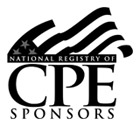
View Details/Register
View Details/Register
View Details/Register
View Details/Register
View Details/Register
View Details/Register



CPA - medium firm
CPA - large firm
Other
This session takes a unique approach to exploring ethics in the accounting profession. The primary focus is on the most critical, and often the most neglected, element of ethical decision-making, THE INDIVIDUAL. This session is designed to take the participants through in-depth self-discovery that helps them understand why they think and behave the way they do. This enhanced level of self-awareness allows the participants to apply their learnings to the ethical decision-making process. Specifically, this session guides the participants through a process that helps them learn how their psychological makeup naturally positions them to be an ethical decision-maker and how that same make-up may detract them from being an ethical decision-maker. This is accomplished by having the participants take a personality assessment and then teaching them how to interpret their specific results. Through discussion and exercises, the concentrated emphasis is then given to applying their personality make-up to the ethical decision-making process. The session content is then synthesized with the guiding principles of the accounting profession.
Learning Objectives:
- Recall the Ethical Decision-Making process, moral cognitive development, and the most common myths associated with ethical decision making
- Determine your personality preferences
- Identify the impact of various personality preferences (i.e., beyond your own) on the ethical decision-making process
- Identify the psychological processes and ethical decision making with the AICPA code of conduct
- Determine the counter-productive psychological processes that impede the ethical decision-making process (i.e., rationalization and impression management)
- Identify the biases that most adults fall victim to when confronted with a moral dilemma
- Define moral courage - which helps a person stand up in accordance to his/her moral compass even in the face of adversity so that ethical behavior occurs
- Define moral resiliency - which helps a person bounce back from adversity and complex situations so that ethical behavior is continued

Jeremy Wortman
HRD Initiatives
Talent Management Consultant
jwortman@hrdinitiatives.com
(402) 817-4902
With a strong passion for and a commitment to the positive development of individuals and organizations, Jeremy Wortman is the Owner of HRD Initiatives, specializing in leadership development, organizational development, and talent management solutions. In this capacity, he works with client partners’ executive teams in determining talent management strategies, building leadership talent, implementing solutions, and coaching individual leaders.
Wortman has more than twenty years of experience in organization and leadership development with a significant amount of his time, early in his career, at TD Ameritrade, where he was the Director of Organizational Effectiveness. There, he was responsible for enterprise-wide talent management initiatives. He partnered with senior executives to determine business unit and department-level talent management strategies and solutions that drove their performance goals. He was also responsible for building their leadership development programs. He has extensive knowledge of organizational psychology and has had great success in developing strategies and programs that make better individuals and organizations using a strengths-based approach.
- To receive CPE credit, you must register for the webinar before it starts.
- CPE is available to all eligible participants within 24 hours of each webinar.
- To receive CPE for multiple attendees, at least one person must sign up for the webinar. The post-webinar email contains a link to instructions for the proctor letter. Alternatively, you may log in to your account following the webinar and click on the MY ACCOUNT button to find a link to instructions. For paid courses, payment needs to be made for each attendee before credit will be issued.

NASBA Approved
CPAacademy.org (Sponsor Id#: 111889) is registered with the National Association of State Boards of Accountancy (NASBA) as a sponsor of continuing professional education on the National Registry of CPE Sponsors. State boards of accountancy have final authority on the acceptance of individual courses for CPE credit. Complaints regarding registered sponsors may be submitted to the National Registry of CPE Sponsors through its website: www.nasbaregistry.org.
CPAacademy.org 1685 S. Colorado Blvd, Suite #205, Denver, CO 80222



